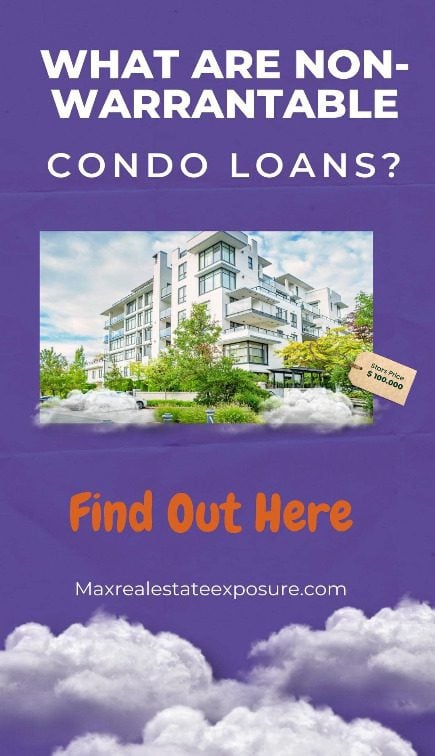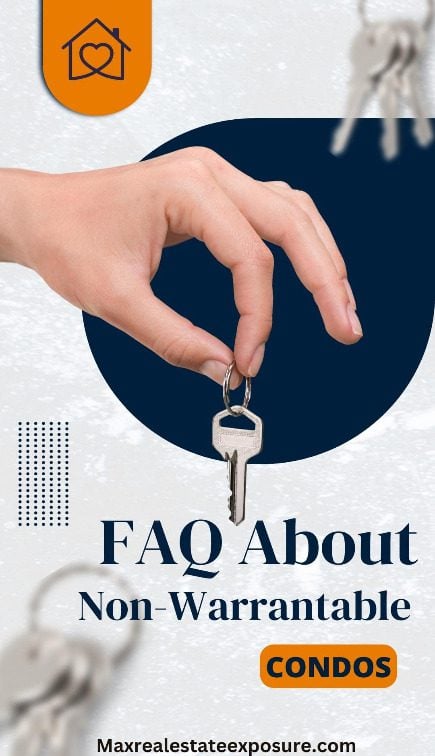 Have you just heard about this type of condo and are wondering what it means and how it works?
Have you just heard about this type of condo and are wondering what it means and how it works?
Understanding Non-Warrantable Condos and their financing challenges is crucial when purchasing a condominium.
Non-warrantable condos fail to meet requirements set by agencies like Fannie Mae, Freddie Mac, and the FHA.
Factors that make a condo non-warrantable include incomplete projects, short-term rentals, and developer control.
Usually, more than 50 percent of the condos must be owner-occupied in a condominium project. Additional situations include one person or entity owning more than 10 percent of the homes.
While financing non-warrantable condos can be difficult, it is not impossible. Exploring specialized lenders who offer competitive programs can provide suitable options.
Working as a real estate agent for the last three decades, I’ve run into unwarrantable condos occasionally.
It can be frustrating to run into this situation as a buyer when you have your heart set on a specific condo. I always recommend my clients investigate this situation upfront.
Most of the time, a knowledgeable listing agent will disclose this upfront to potential buyers.
Whenever buying a condo, one of the first things you should always investigate is the financial stability of the community. Without doing so, you can waste a significant amount of time, money, and energy on a property you may not be able to buy.
Let’s review what you need to know about these types of condominiums, including non-warrantable condo loans.
Understanding Non-Warrantable Condos
When purchasing a condo, it’s crucial to understand the concept of non-warrantable condos and how they differ from their warrantable counterparts.
As mentioned, unwarrantable condos do not meet the eligibility criteria set by agencies like Fannie Mae, Freddie Mac, and the FHA, making financing for these types of properties challenging.
What Makes a Condo Non Warrantable?
Several factors can classify a condo as non-warrantable. One common reason is when the condominium project is incomplete, meaning it is still under construction or development.
It is likely an HOA has not been established yet with new construction.
Additionally, if the condo allows short-term rentals or is under the developer’s control, it may be deemed non-warrantable.
Financing Challenges
Securing financing for non-warrantable condos can be more difficult compared to warrantable condos. Traditional lenders typically follow the guidelines set by Fannie Mae and Freddie Mac. Unfortunately, they don’t allow non-warrantable condos in their financing programs.
This presents challenges for buyers who wish to purchase these types of properties.
Exploring Mortgage Options
Fortunately, there are alternative financing options available for non-warrantable condos. One option is to consider portfolio loans. These are mortgages held by the lending institution instead of being sold to government-sponsored entities.
Working with specialized lenders with experience financing non-warrantable condos can also provide viable solutions. In my career, there have been a few occasions when a borrower was forced down this road.
Additionally, exploring FHA-approved condos may offer financing possibilities for specific non-warrantable condos that meet specific FHA criteria.
Navigating the complexities of financing non-warrantable condos requires careful consideration. I always recommend working with a mortgage broker who understands these properties.
We will investigate the different financing options for non-warrantable condos.
Non-Warrantable Condo Financing Options
 There are some options if you have found the perfect home and can’t stand the thought of not buying it.
There are some options if you have found the perfect home and can’t stand the thought of not buying it.
While Non-warrantable condos pose unique financing challenges for buyers, alternative loans are available to secure financing for these condominiums.
Here are some key financing options to consider:
Portfolio Loans
Portfolio loans are a popular choice for financing non-warrantable condos. These loans are held in lenders’ portfolios instead of sold to government-sponsored enterprises like Fannie Mae or Freddie Mac.
Portfolio lenders have more flexibility in their underwriting guidelines. It makes them more inclined to approve financing for non-warrantable condos.
These loans often have slightly higher interest rates. However, they offer buyers an opportunity to secure funding when traditional options are unavailable.
Working with Specialized Lenders
Specialized lenders who focus on non-warrantable condos can be a valuable resource. These lenders have extensive experience financing non-warrantable properties and have developed specific loan programs tailored to these condos.
When you have an excellent mortgage broker, they know who to turn to.
Working with specialized lenders increases the chances of obtaining financing for an unwarrantable condo. Specialized lenders ensure that the loan terms and requirements align with the property’s unique characteristics.
FHA Approved Condos
Although non-warrantable condos do not meet the requirements of agencies like the Federal Housing Administration (FHA), it is worth exploring if the condo community is FHA-approved. An FHA-approved condo community can still offer financing options for buyers interested in non-warrantable condos.
FHA-approved lenders can provide financing in these cases, considering the individual unit’s eligibility even if the entire condo complex is deemed non-warrantable.
These alternatives offer potential solutions to overcome the challenges associated with financing non-warrantable condos. Buyers need to work closely with lenders experienced in dealing with non-warrantable properties to find the most suitable financing option for their specific needs.
Non-warrantable condo loans are more lender-specific, so you must do more research. Here is a detailed guide on what to know about FHA loans.
Warrantable vs. Non-Warrantable Condo
As you might imagine, having it be warrantable is significantly better when selling a condo. The more marketable you can make any property, the better. It will be essential to remember this when it comes time to sell.
Steps to Take if Your Condo Isn’t Warrantable
If you discover that your condo is non-warrantable, there are several steps you can take to navigate the financing challenges. Here are some essential actions to consider:
Evaluating Alternative Financing Solutions
When faced with a non-warrantable condo, the first step is to explore alternative financing options. These may include seeking lenders specializing in non-warrantable condo loans or considering portfolio loans.
Take the time to research and compare different lenders to find the best fit for your specific needs.
Renovation Loans
In some cases, renovating your non-warrantable condo may increase its eligibility for traditional financing. Renovation loans, such as FHA 203(k) or Fannie Mae HomeStyle® renovation mortgages, can fund necessary improvements.
Consult with lenders or contractors to determine if these loans are viable options for your condo.
Refinancing Options
Exploring refinancing options can be beneficial if you already own a non-warrantable condo. Refinancing can help you secure better terms and potentially convert your non-warrantable condo into a warrantable one.
Discuss your situation with various lenders to determine if refinancing is a viable solution.
Remember, navigating the complexities of non-warrantable condos can be challenging, but with careful evaluation and assistance from specialized lenders, alternative financing solutions, renovation loans, or refinancing may offer viable options to consider.
Resources for Non-Warrantable Condo Buyers
Understanding Fannie Mae and Freddie Mac Guidelines
Non-warrantable condo buyers must familiarize themselves with the guidelines set forth by Fannie Mae and Freddie Mac. These government-sponsored enterprises have specific requirements for condo financing, and understanding these guidelines helps buyers navigate the financing process effectively.
You can use Fannie Mae’s project eligibility review service to see if the condo community will meet their requirements. Madison Mortgage Guys provides a comprehensive resource on what makes a condo warrantable with Fannie Mae and Freddie Mac.
Exploring Financing Programs for New Construction Condos
Buyers interested in purchasing non-warrantable condos still under construction should explore financing programs tailored to new construction projects. These programs may offer specialized loan options and flexible terms that cater to the unique needs of buyers in such situations.
Finding the Right Lender
I can’t emphasize it enough. Finding a suitable lender is crucial. It requires thorough research and comparison to ensure you receive the best loan terms and options.
Here are the key steps to help you find the right lender:
Researching and Comparing Lenders
Start by conducting extensive research on lenders who specialize in financing non-warrantable condos. Look for lenders with experience and a strong track record in providing loans for these properties.
Compare their interest rates, loan terms, and fees to determine which lender offers the most favorable terms for your situation.
Contacting Loan Experts
Once you have narrowed your list of potential lenders, contact loan experts who can provide valuable insights and guidance. These experts have in-depth knowledge of non-warrantable condo financing and can answer any questions or concerns. Their expertise will help you determine the lender that best suits your needs.
Applying for This Type of Condo Loan
After selecting a lender, you can apply for a non-warrantable condo loan. Gather all the necessary documents, such as financial statements, tax returns, and proof of income.
Complete the application accurately and provide any additional documentation required by the lender. Be prepared for a thorough review of your financial history, credit score, and the condo details you wish to finance.
Remember, the goal is to find a lender who understands non-warrantable condos’ unique challenges and requirements and will work with you to secure the financing you need.
With the right mortgage lender, you can navigate the complexities of non-warrantable condo financing and move closer to owning your dream property.Click To TweetFrequently Asked Questions
 Here are some common questions that arise regarding non-warrantable condos:
Here are some common questions that arise regarding non-warrantable condos:
Can I Still Get a Mortgage for a Purchase?
Yes, it is possible to obtain a mortgage for an unwarrantable condo. Although these condos do not meet the requirements of government financing agencies, some specialized lenders offer loan options for such properties.
By exploring portfolio loans and working with lenders experienced in non-warrantable condos, you can secure financing for your purchase.
How Does the Status Impact Property Values?
Being classified as an unwarrantable condo can potentially impact property values. Some buyers may hesitate to invest in a non-warrantable condo due to concerns about financing challenges and limitations on eligible buyers.
However, property values depend on location, demand, and the current real estate market.
Can These Condominiums Be Warrantable in the Future?
Yes, non-warrantable condos have the potential to become warrantable in the future. This can happen as the condo association addresses issues that make them non-warrantable, such as completing the project or changing rental policies.
It is essential to stay updated with the condo association’s efforts to become warrantable if this concerns you.
Are These Condo Loans Riskier for Lenders?
Non-warrantable condo loans can carry higher risks for lenders than warrantable ones. These risks stem from ignoring established guidelines and eligibility criteria.
However, specialized lenders focusing on non-warrantable condos have expertise in managing these risks. They offer competitive loan programs designed specifically for such properties.
Conclusion
While buying unwarrantable condos is challenging, it is not impossible. Do your research early on to increase your odds of success with this type of purchase.
About the Author: Bill Gassett, a nationally recognized leader in his field, provides information on non-warrantable condos. He is an expert in mortgages, financing, moving, home improvement, and general real estate.
Learn more about Bill Gassett and the publications in which he has been featured. Bill can be reached via email at billgassett@remaxexec.com or by phone at 508-625-0191. Bill has helped people move in and out of Metrowest towns for the last 38+ years.
Are you thinking of selling your home? I am passionate about real estate and love sharing my marketing expertise!
I service Real Estate Sales in the following Metrowest MA towns: Ashland, Bellingham, Douglas, Framingham, Franklin, Grafton, Holliston, Hopkinton, Hopedale, Medway, Mendon, Milford, Millbury, Millville, Natick, Northborough, Northbridge, Shrewsbury, Southborough, Sutton, Wayland, Westborough, Whitinsville, Worcester, Upton, and Uxbridge MA.

